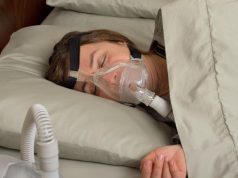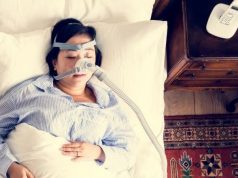However, positive airway pressure therapy tied to lower rates of infection
TUESDAY, June 22, 2021 (HealthDay News) — Untreated obstructive sleep apnea (OSA) is associated with increased rates of COVID-19 infection, while positive airway pressure (PAP) therapy is associated with lower COVID-19 infection rates, according to a study presented at the annual meeting of the Associated Professional Sleep Societies, SLEEP 2021, held virtually from June 10 to 13.
Dennis Hwang, M.D., from Kaiser Permanente in Southern California, and colleagues assessed the impact of OSA and PAP therapy on COVID-19 infection rate and severity. The analysis included 81,932 patients evaluated by Kaiser Permanente Southern California sleep medicine (2015 to 2020).
The researchers report 1.8 percent of patients had COVID-19, with 0.3 percent requiring hospitalization and 0.07 percent resulting in intensive care or death. There was an association observed between increased severity of “untreated” OSA and a higher COVID-19 rate: no OSA, 1.7 percent; mild OSA, 2 percent; moderate OSA, 2 percent; severe OSA, 2.4 percent; OSA unknown severity, 2 percent; and treated OSA, 1.4 percent. There was also an association noted between better PAP adherence and a reduced infection rate: untreated OSA, 2.1 percent; moderately treated OSA, 1.7 percent; well-treated OSA, 1.3 percent; and no OSA, 1.7 percent). The investigators observed a dose-response association between OSA severity and infection rate (odds ratios for mild OSA and moderate-severe OSA versus no OSA, 1.21 and 1.27, respectively). There were no significant associations between OSA presence or PAP adherence and the rate of hospitalization, intensive care, or death.
“Significant associations emerged with OSA increasing and PAP therapy reducing COVID-19 infection rate,” the authors write. “Findings support continued PAP use during the pandemic.”
Two authors are employed by ResMed.
Copyright © 2021 HealthDay. All rights reserved.








